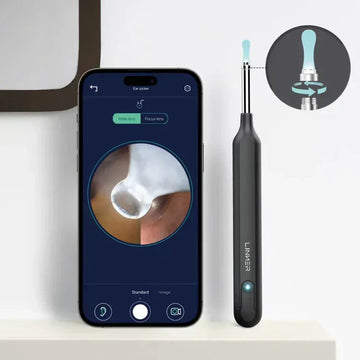Hearing loss is a common issue among the elderly, often affecting their ability to communicate, engage socially, and maintain a good quality of life. As hearing declines with age, choosing the right hearing aid becomes crucial to improving daily functioning and overall well-being.
With a wide range of affordable hearing aids now available, finding the best device can be overwhelming. This article starts with the causes of hearing loss in the elderly. It shows the benefits of using hearing aids for the elderly with hearing loss and also reviews the top 5 best hearing aids for seniors.
Why Is Hearing Loss Common in Elderly
As hearing loss becomes increasingly prevalent with age, many start to wonder: Why is hearing loss common in the elderly? Here are some key factors:
1. Presbycusis (Natural Aging Process)
Age-related hearing loss, known medically as presbycusis, is a gradual and progressive condition that commonly affects older adults.
Over time, the tiny hair cells in the inner ear (cochlea) that help transmit sound signals to the brain begin to deteriorate. This natural degeneration reduces the ability to hear high-frequency sounds and understand speech clearly, especially in noisy environments.
2. Environmental Factors (Noise-Induced Hearing Loss)
Long-term exposure to loud noises, from music, machinery, traffic, to occupational environments, can damage the sensory hair cells in the ear.
Even everyday sounds at high volumes, such as from lawnmowers and headphones, can contribute to hearing loss over time.
3. Chronic Health Conditions
Conditions such as diabetes, hypertension, and cardiovascular disease can affect blood flow to the ears, leading to hearing loss.
Additionally, ototoxic medications, such as some antibiotics and chemotherapy drugs, can damage the inner ear structures.
4. Genetic Predisposition
Some individuals may be genetically more susceptible to hearing loss as they age. A family history of hearing impairment increases the likelihood of developing presbycusis.
After understanding the causes, recognizing the early signs of hearing loss in seniors is key to seeking timely help and improving quality of life. Common symptoms include difficulty understanding speech, trouble hearing high-pitched sounds, turning up the volume, and ringing in the ears.

Benefits of Using Hearing Aid for Elderly with Hearing Loss
When suffering from hearing loss, remember to ask for help at once. Hearing aids become important and useful tools to improve the lives of the elderly by addressing the challenges that come with age-related hearing loss. Below are some of the key benefits:
1. Improved Communication and Relationships
Hearing aids help seniors better understand conversations, whether in person or over the phone. This leads to clearer communication with family, friends, and caregivers, reducing misunderstandings and strengthening personal relationships.
Being able to actively participate in social interactions also helps maintain a sense of connection and belonging.
2. Enhanced Safety and Awareness
Hearing aids make it easier to detect important environmental sounds, such as doorbells, smoke alarms, car horns, and someone calling for help. This heightened awareness of surroundings plays a crucial role in preventing accidents.
3. Better Mental Health and Reduced Cognitive Decline
Untreated hearing loss has been linked to social isolation, depression, and even cognitive decline. This increases the risk of dementia.
By restoring auditory input, hearing aids help keep the brain engaged, support emotional well-being, and may slow down the progression of cognitive issues.
4. Higher Quality of Life and Independence
Seniors who use hearing aids often report a greater sense of control and autonomy in their daily lives. They can enjoy hobbies, attend events, run errands, and communicate without relying heavily on others.
This independence contributes to a higher overall quality of life and increased confidence.

What to Consider When Choosing Hearing Aid for Elderly
To ensure comfort, functionality, and long-term satisfaction, you have to select the right hearing aids for the elderly. Below are several factors for you to consider:
1. Ease of Use
Hearing aids for the elderly should have simple controls and intuitive features. Seniors may struggle with tiny buttons and complex settings. Models with automatic adjustments, large controls, and smartphone compatibility can make daily use much easier.
2. Comfort and Fit
Since hearing aids are worn for extended periods, they must fit comfortably in or behind the ear. Poorly fitting devices can cause irritation and even pain. Lightweight, ergonomic designs and customizable ear molds help ensure a secure and comfortable fit tailored to the wearer’s ear shape.
3. Battery Life
Long battery life is especially important for convenience and uninterrupted use. Some models use disposable batteries, while others come with rechargeable options.
Rechargeable hearing aids are often more user-friendly, eliminating the need to handle and replace small batteries.
4. Bluetooth or Wireless Features
Many modern hearing aids offer Bluetooth connectivity. This enhances both convenience and sound quality.
Wireless features also enable remote adjustments via smartphone apps, which can be helpful for caregivers and audiologists.
5. Customer Support and Warranty
Reliable customer service and a solid warranty are crucial, especially if issues arise. Seniors may need help with setup, maintenance, and repairs.
Brands that offer strong after-sales support, trial periods, and extended warranties provide peace of mind and ensure long-term satisfaction.

Top 5 Best Hearing Aid for Elderly in 2025
After knowing the factors to choose hearing aids for the elderly, you may start to select the right brands for hearing aids. Below are the top 5 best hearing aids for seniors in 2025.
1. Linner Mercury
Linner Mercury is the smallest among its competitors. As one of the most compact RIC hearing aids on the market, it offers an exceptionally comfortable, secure, and almost invisible fit for the wearer.
It is equipped with advanced U.S. Onsemi™ chips and features 16-channel WDRC technology, delivering precise and adaptive sound processing for a clearer listening experience.
It boasts a battery life of 80 hours, making it stay powered from morning to night. This adds reliability to Mercury with one single charge.
It serves best for seniors seeking an accessible and easy-to-use hearing aid without complex features.
Key features:
-
Compact and Nearly Invisible Design
-
16 WDRC Channels for Precise Sound Processing
-
Premium Finish and Noise Reduction
-
80-hour Battery Life
-
Portable On-the-go
2. Linner Saturn
The Linner Saturn hearing aids offer a blend of powerful performance and a sleek, ultra-discreet design. Featuring advanced U.S. Onsemi™ chips, these CIC hearing aids deliver exceptional sound clarity. With a dependable rechargeable battery, LINNER Saturn keeps you connected throughout the day.
It is nominated Best OTC hearing aids by Forbes. It won the Hearing Innovator Award in 2023 and 2024. Available in major KA BestBuy, it enjoys high satisfaction.
It is best for individuals with mild hearing loss looking for a discreet and comfortable hearing aid.
Key features:
-
Lightweight, Ultra-discreet Design
-
Rechargeable with 3x Extra Charges
-
Feedback Shield Technology
-
LED Battery Indicator

3. Phonak Audéo Lumity
Phonak Audéo Lumity is a hearing aid designed to enhance speech understanding and provide a natural listening experience, especially in challenging environments. Introduced in 2022, it incorporates advanced features and technologies to cater to individuals with varying degrees of hearing loss.
It is best for seniors with active lifestyles who need versatile and high-performance hearing aids.
Key features:
-
AutoSense OS™ 5.0 Technology
-
StereoZoom 2.0
-
Bluetooth Connectivity for Streaming Audio
-
Rechargeable with Long Battery Life
4. Oticon Real
Oticon Real is designed to deliver natural sound experiences and reduce listening effort, especially in dynamic or noisy environments. It builds upon Oticon’s BrainHearing™ philosophy, aiming to support the brain's natural processing of sounds by providing access to the full soundscape.
It is best for the elderly who seek a balance between advanced technology and ease of use.
Key Features:
-
RealSound Technology™
-
Deep Neural Network (DNN)
-
Bluetooth Connectivity for Audio Streaming
-
Rechargeable with a Durable Design
5. Eargo 7
Eargo 7 is an over-the-counter (OTC) hearing aid designed for individuals with mild to moderate hearing loss. Its discreet, completely-in-canal (CIC) design and advanced features make it a compelling choice for users seeking both aesthetics and functionality.
It is best for tech-savvy seniors who are looking for a discreet and feature-rich hearing aid.
Key Features:
-
Invisible-in-canal (IIC) Design
-
Rechargeable with a Portable Charging Case
-
Sound Adjust+ Feature
-
In-app SoundMatch Hearing Test
For the elderly choosing suitable hearing aids, Linner Mercury and Linner Saturn stand out from numerous hearing aids brands.
Tips When Using Hearing Aid for Elderly
The elderly should practice good cleaning habits when using hearing aids. Here are some tips.
-
Clean your hearing aids daily with a soft, dry cloth.
-
Avoid water, alcohol, or cleaning agents unless recommended.
-
Use a hearing aid cleaning brush or pick for wax removal if needed.
-
Store them in a dry, safe place, ideally in a dehumidifier case.

FAQs
What Are the Most Comfortable Hearing Aid for Elderly?
With the advantages of being ultra-light and nearly invisible, Linner Mercury and Linner Saturn emerge as the most comfortable hearing aids for the elderly.
How Much Do Good Hearing Aids Cost for the Elderly in 2025?
In 2025, prices range from $1,000 to over $6,000 per ear based on technology, brand, and features.
Can Hearing Aids Help with Tinnitus?
Yes, many modern hearing aids can alleviate tinnitus symptoms.
Are Rechargeable Hearing Aids Better Than Battery-Powered Ones?
They have their own advantages. But rechargeable hearing aids are increasingly preferred by seniors due to ease of use, cost-effective, and reliable charging cases.
How Often Should Hearing Aids Be Replaced?
On average, hearing aids should be replaced every 3 to 5 years.
Conclusion
Hearing loss is a common part of aging, but it doesn’t have to diminish your quality of life. In this article, you can find reasons for hearing loss among the elderly. This article has also explored the causes of hearing loss, highlighted the benefits of using hearing aids, and provided guidance on how to choose the right one.
Among the top 5 best hearing aids for the elderly in 2025, Linner Mercury and Linner Saturn are the most suitable. Visit the official Linner website to find the best fit for your needs.
Read more:





